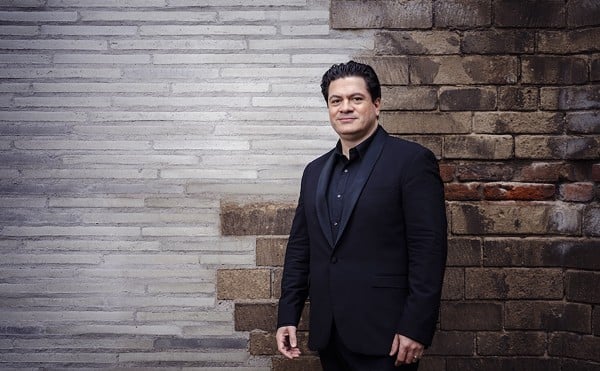L
ast spring, singer/songwriter Sturgill Simpson was overly anxious about the arrival of his debut album, High Top Mountain. He’s spent this year simultaneously anticipating the birth of his debut child and the reception of his just-released sophomore album, Metamodern Sounds in Country Music.
And his mood couldn’t be more joyously relaxed.
“They’re giving me four weeks to get to know my newborn son, and then I’ll probably see him again when he’s 2,” Simpson jokes via phone from his Nashville home. “This whole record thing has taken this giant backseat in my head, compared to everything else that’s going on. With the first album, I worried about things that were completely out of my control. This has been a much different situation. I did it with my band so I feel like I have a team of brothers and we’re all on the same mission. It’s been a lot of fun.”
Thirteen months ago, Simpson self-released High Top Mountain to the kind of acclaim that new artists only hope to generate. Comparisons to Waylon Jennings and Merle Haggard were frequent and well-deserved, but that kind of press-kit glory can intimidate the most self-assured performer.
“I don’t need any help in that department — I’m definitely my own worst critic and enemy,” Simpson says.
After High Top’s release, Simpson and his band — guitarist Laur Joamets, bassist Kevin Black, drummer Miles Miller — began a grueling tour promoting the traditional Country album. During the subsequent year, High Top’s songs evolved and Simpson’s new material exuded a very different Country vibe.
“I feel like I carved out my own sound and found my voice a bit more and became a better singer,” Simpson says. “The studio is just a microscope to really test yourself to see what you’ve accomplished since the last time you did this.”
What Simpson accomplished on his second pass was nothing short of miraculous. For his sophomore album, Simpson utilized his hypertalented live band, as well as producer Dave Cobb, who manned the board for High Top. With just a handful of new songs — some of which were inspired by Simpson’s examinations of string theory, religion, quantum physics and otherworldly occurrences due to the hallucinogen DMT — the band and producer hit the studio on a four-day tour break and turned a $4,000 budget into Metamodern Sounds in Country Music, one of 2014’s best releases in any genre.
“On (High Top), Dave and I followed the delicate thing of a producer and artist getting to know each other,” Simpson says. “By the time we finished a week later, Dave had a profound understanding of me as a person and personality. We’ve actually become incredibly close friends. There wasn’t really a discussion with this one, he was like, ‘What do you want to do?’ And I said, ‘I’ve been reading this, this and this, and I’ve got these songs and I want it to sound like the roughest life you could ever live, that texture and realness.’ And he was like, ‘Yeah, I got it.’ I’m most happy … that it all feels linear and there’s a synergy to it, like all those songs belong together. I want to record albums that people want to listen to all the way through.”
With Metamodern Sounds, Simpson crafted an album that nods toward ‘70s Outlaw Country with trippy elements of Rock, Folk and even Electronica. The album’s sonic diversity gives it a unique atmospheric quality that is both informed by the past and firmly rooted in the present.
“A lot of Gene Clark, early Gosdin Brothers, a little ‘60s California/Bakersfield psychedelic intertwined, Clarence White, Procol Harum, early Roy Buchanan,” Simpson says, rattling off the influences that are woven into Metamodern Sounds. “Like early Merle (Haggard) records with a little more grit, like if Merle and the Strangers were all heroin addicts.”
Simpson knows about building without a blueprint. The Kentucky native learned guitar at 6 (both of his grandfathers were musicians) and by high school, he’d become engrossed in Mississippi John Hurt and Blind Lemon Jefferson. Simpson gave up music during his Navy stint, then returned to Lexington and played sporadically in a local band before taking a railroad job and shelving music again. Simpson’s wife became the catalyst for his explosive return to music.
“If it wasn’t for her, I wouldn’t be doing this,” he says. “For whatever reason, at the end of that jaunt with the railroad, I was really depressed, so I started playing at home which turned into writing a lot. She bought me a little 12-track at Guitar Center and said, ‘You should learn how to use this and record some stuff.’ So I did. Then she snuck off to the local radio station in Salt Lake City and begged them to play my stuff. We’d meet friends for dinner at barbeque joints and next thing I know, she’s pulling my guitar out of the car and I’m getting up and singing five or six songs. I just kind of fell in love with (making music) all over again. She told me, ‘You’re going to wake up and be 40 and know that you never tried to do what you really love and then I’m stuck with you.’ So we sold everything we couldn’t give away, and she and I and our hound dog Hank packed up a Ford Bronco and drove to Nashville. That was about four years ago. It’s been one completely surreal baby step forward after another, and I’m just trying to stay humble and appreciative and not take any of it for granted.”
There’s no chance of Simpson taking anything for granted at this point. He’s quick to give credit away and deflects any undue attention to his own considerable gifts, and he’s genuinely amazed at the outpouring of positivity surrounding Metamodern Sounds. When he ponders the idea that he might have the same career longevity as the icons he’s been compared to, he has an appropriately self-deprecating response.
“I hope so — I don’t what else I’m going to do,” Simpson says. “I would be up shit creek. For good or bad, I have to see it through. It’s all bubblegum and ice cream now, but 10 years from now, I’ll probably write my Blood on the Tracks and get brutally raped by the press. I know the bad will come at some point, and if you believe the good, you’ve got to believe the bad. I try to steer clear of all that but right now, honestly, I’m so sick of myself. There’s so much hype, it makes me nervous because there’s nowhere to go from there. Obviously, we’re left with the problem of what next. If I had any smarts at all, I’d just retire.” ©
STURGILL SIMPSON performs at the Buckle Up Music Festival at Sawyer Point 4:15 p.m. Friday on the Main Stage. Tickets/more info: buckleupfestival.com.






